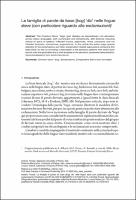Chapter La famiglia di parole da base [bog] ‘dio’ nelle lingue slave (con particolare riguardo alle esclamazioni)
| dc.contributor.author | Trovesi, Andrea | |
| dc.date.accessioned | 2024-04-02T15:51:04Z | |
| dc.date.available | 2024-04-02T15:51:04Z | |
| dc.date.issued | 2023 | |
| dc.identifier | ONIX_20240402_9791221502169_225 | |
| dc.identifier.issn | 2612-7679 | |
| dc.identifier.uri | https://library.oapen.org/handle/20.500.12657/89256 | |
| dc.language | Italian | |
| dc.relation.ispartofseries | Biblioteca di Studi Slavistici | |
| dc.subject.classification | thema EDItEUR::C Language and Linguistics::CF Linguistics | |
| dc.subject.classification | thema EDItEUR::D Biography, Literature and Literary studies::DS Literature: history and criticism | |
| dc.subject.other | Common slavic *bog- | |
| dc.subject.other | Exclamations | |
| dc.subject.other | Comparative Slavic word formation | |
| dc.title | Chapter La famiglia di parole da base [bog] ‘dio’ nelle lingue slave (con particolare riguardo alle esclamazioni) | |
| dc.type | chapter | |
| oapen.abstract.otherlanguage | The Common Slavic *bogŭ ‘god’ displays an astonishingly rich derivation across Slavic languages, both numerically and semantically, with lexemes including almost all parts of speech: inflected (nouns, adjectives, verbs, pronouns) and not inflected (adverbs, connectives, prepositions). In this article the author pays special attention to the exclamations and other exclamation-related expressions containing this base word, as well as providing a description of the syntactic patterns from which such lexical units are generated and a brief analysis of the semantic processes (lexicalization, refunctionalization) from which they derive. | |
| oapen.identifier.doi | 10.36253/979-12-215-0216-9.10 | |
| oapen.relation.isPublishedBy | bf65d21a-78e5-4ba2-983a-dbfa90962870 | |
| oapen.relation.isbn | 9791221502169 | |
| oapen.series.number | 54 | |
| oapen.pages | 10 | |
| oapen.place.publication | Florence |

